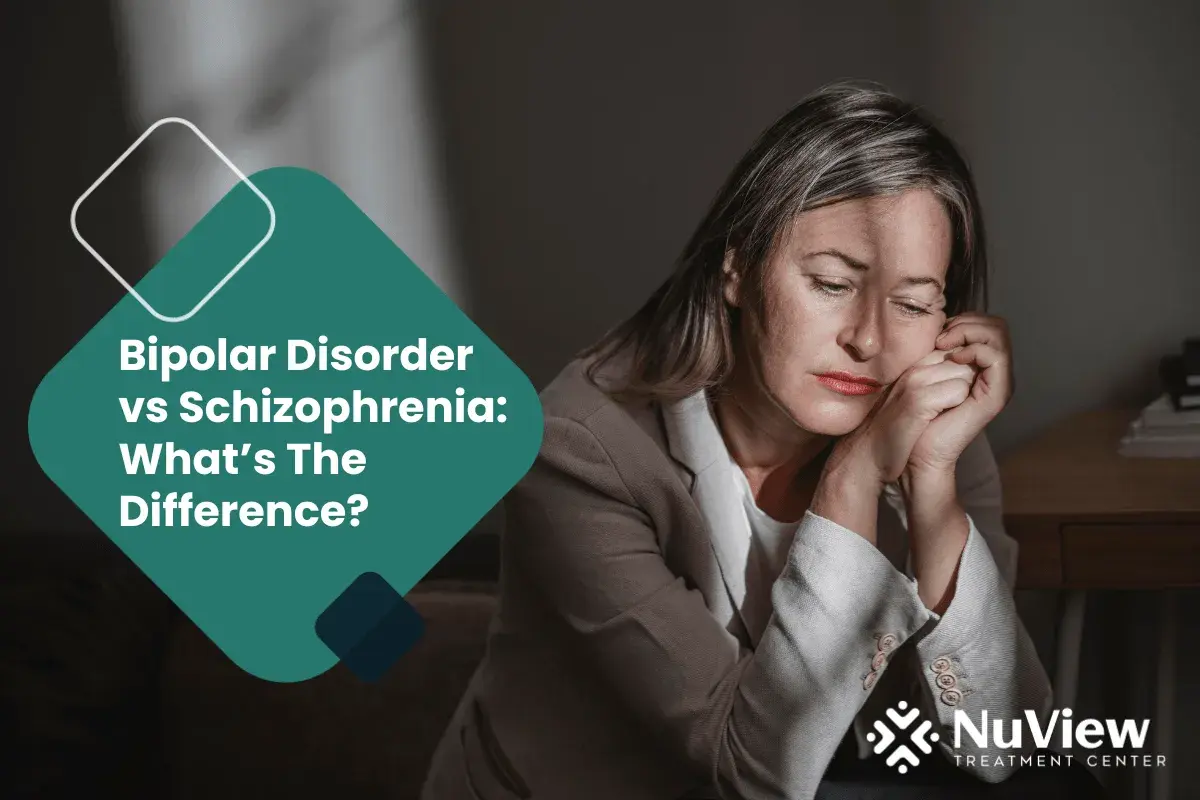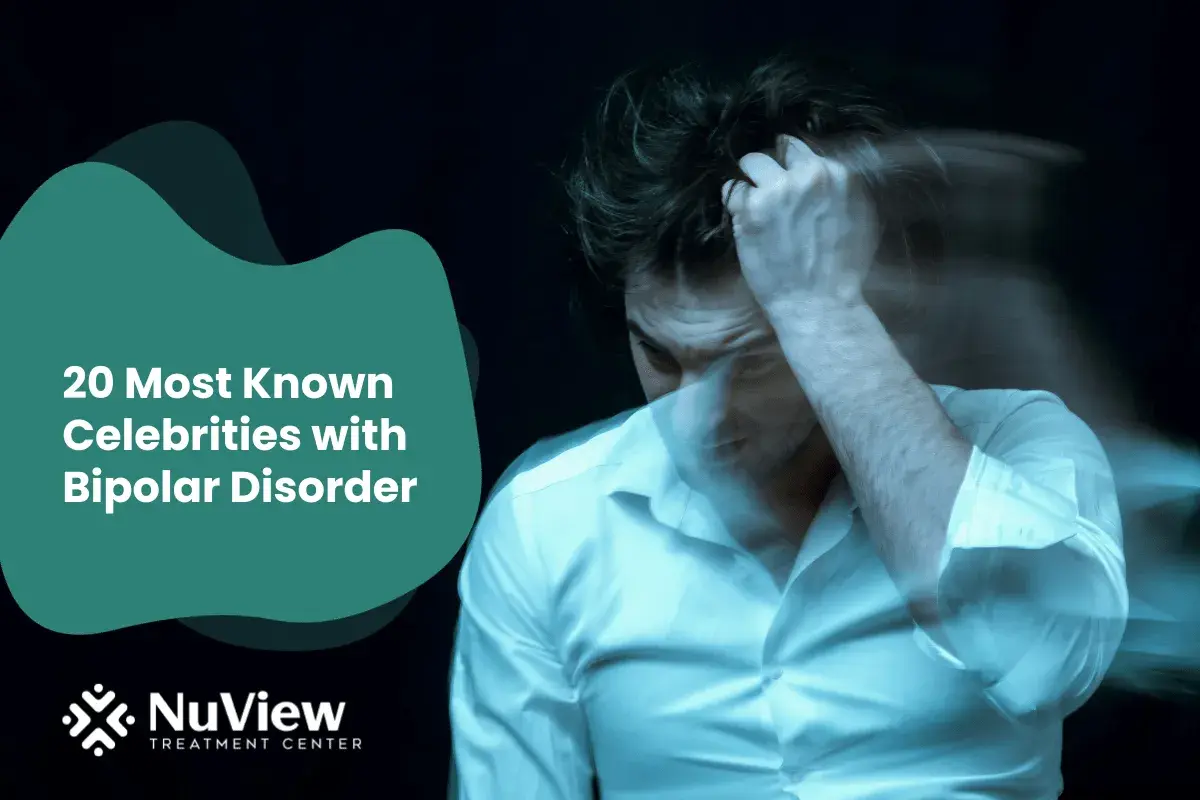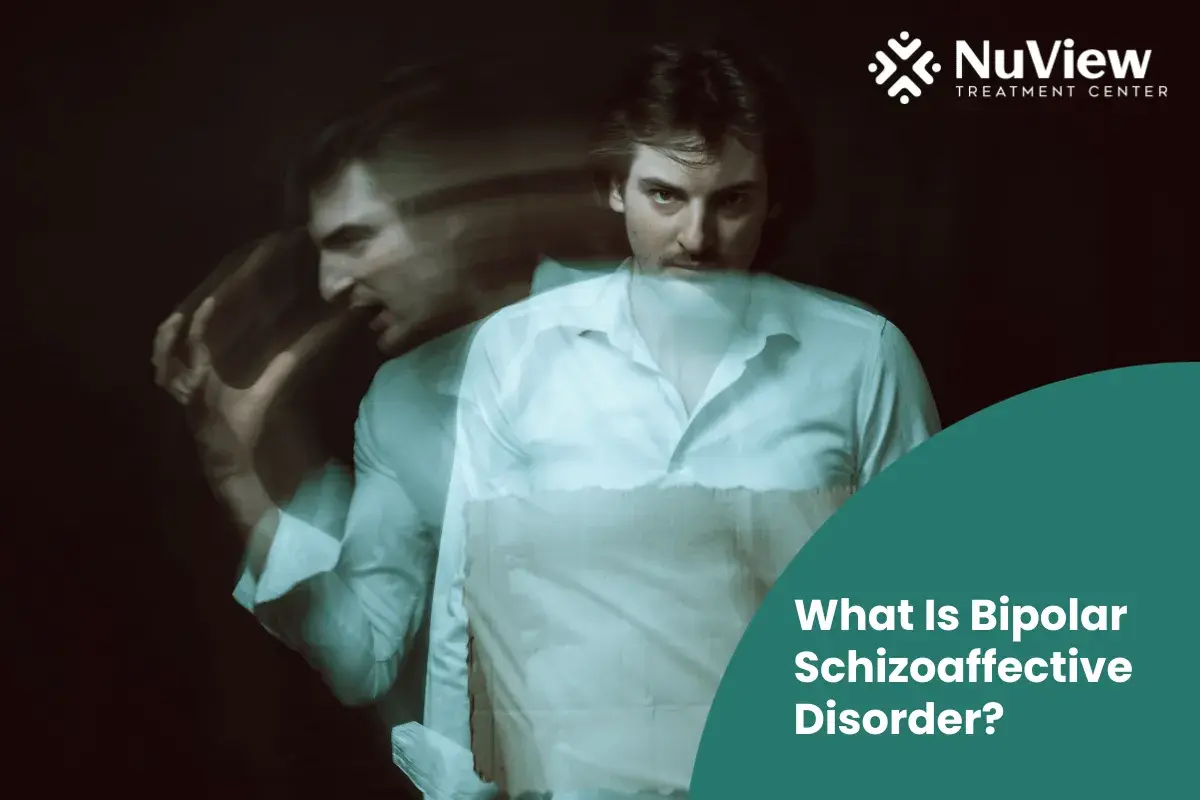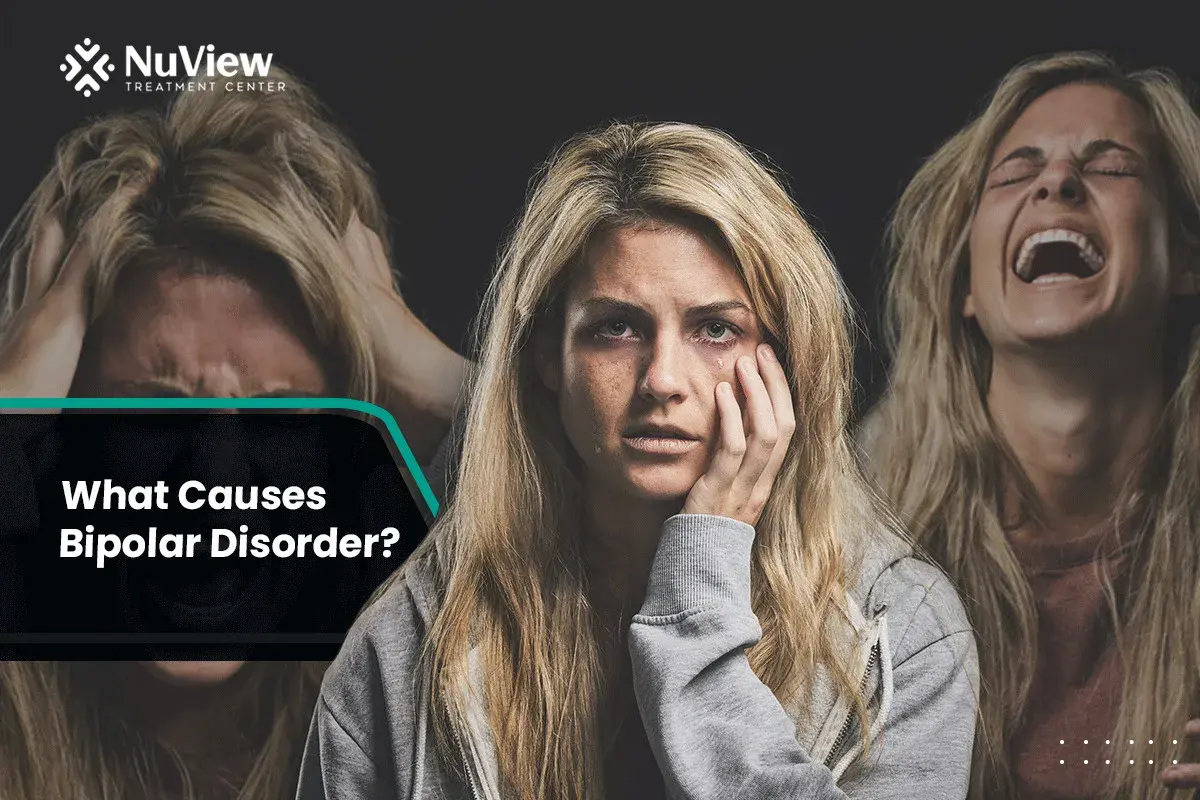Bipolar disorder and schizophrenia are distinct mental health disorders with overlapping traits but key differences. Bipolar disorder primarily involves mood swings, including manic and depressive episodes, interspersed with periods of relative stability. In contrast, schizophrenia is characterized by symptoms that often lead to a distorted perception of reality.
The main difference between bipolar disorder and schizophrenia is that bipolar disorder primarily affects mood, while schizophrenia primarily affects perception and cognition. However, there are some overlaps in symptoms.
For example, some people with bipolar disorder may experience psychotic symptoms during manic or depressive episodes, such as delusions of grandeur or paranoia. Likewise, some people with schizophrenia may experience mood symptoms like depression or anxiety.
Bipolar vs Schizophrenia
Bipolar disorder is a mood disorder that causes episodes of extreme highs (mania) and lows (depression). People with bipolar disorder may experience changes in their energy, activity, sleep, and judgment during these episodes.
Bipolar disorder can be divided into two types: bipolar I and bipolar II. Bipolar I involves at least one manic episode that lasts for a week or more, while bipolar II involves at least one hypomanic episode (a less severe form of mania) and one major depressive episode.
Schizophrenia is a psychotic disorder that affects how a person thinks, feels, and behaves.
People with schizophrenia may have difficulty distinguishing reality from fantasy, and may experience hallucinations (seeing or hearing things that are not there), delusions (false beliefs), disorganized speech and behavior, and negative symptoms (such as lack of motivation, emotion, or pleasure).
Schizophrenia usually develops in late adolescence or early adulthood, and can be triggered by stress, trauma, or substance abuse.
What Are the Key Differences Between Bipolar Disorder And Schizophrenia?
Bipolar Disorder and Schizophrenia are both serious mental health conditions, but they differ significantly.
Bipolar Disorder is characterized by extreme mood swings, including manic highs and depressive lows. Patients may experience periods of normal mood in between these episodes.
In contrast, Schizophrenia involves a profound disruption in thinking and perception, manifesting in symptoms like hallucinations, delusions, and disorganized thinking and behavior. Bipolar Disorder's primary challenge is mood regulation, whereas Schizophrenia centers around a distorted perception of reality and consistent cognitive challenges.
Treatment for Bipolar Disorder often includes mood stabilizers and psychotherapy, while Schizophrenia treatment relies more on antipsychotic medication and therapy focused on improving social and cognitive functioning.
Get Started With Nuview Treatment Center
Our dedicated professional staff is here to guide you or your loved one on the journey to lasting recovery, offering support every step of the way.
How Do Bipolar Disorder And Schizophrenia Symptoms Differ?
| Symptom | Bipolar Disorder | Schizophrenia |
|---|---|---|
| Mood | Manic and depressive episodes | Stable, often flat or inappropriate mood |
| Thinking | Normal to disorganized during episodes | Disorganized, often irrational |
| Perception | Generally remains intact | Hallucinations and delusions common |
| Behavior | Varies with mood swings | Often consistently unusual or erratic |
| Social Interaction | Impacted episodically | Frequently and persistently impaired |
| Awareness | Usually aware of condition | May lack insight into condition |
How Are Both Conditions Treated?
Both bipolar disorder and schizophrenia are chronic and serious conditions that require ongoing treatment and management. The treatment of both conditions usually involves a combination of medication and psychotherapy.
Medication can help stabilize mood disorder symptoms in bipolar disorder and reduce psychosis in schizophrenia. Psychotherapy can help people cope with their emotions, thoughts, and behaviors, and improve their functioning and quality of life.
How Do Bipolar And Schizophrenia Treatment Plan Differ?

Bipolar Disorder and Schizophrenia treatment plans differ mainly in their focus and the types of medications and therapies used.
For Bipolar Disorder:
Medication: The cornerstone includes mood stabilizers (like lithium), antipsychotic medications, and sometimes antidepressants.
Psychotherapy: Therapies like Cognitive Behavioral Therapy (CBT) focus on mood regulation, coping strategies, and identifying triggers for mood episodes.
Lifestyle Changes: Emphasis on regular sleep patterns, stress management, and avoiding triggers like alcohol and drugs.
Support Systems: Support groups and family therapy are often encouraged for broader support.
For Schizophrenia:
Medication: Primarily antipsychotic drugs are used to manage symptoms like hallucinations and delusions.
Psychotherapy: Focuses more on reality orientation, social skills training, and managing daily living skills.
Rehabilitation: Emphasizes skill-building for independent living and vocational training.
Family Therapy: Education and support for families are crucial for managing and understanding the condition.
Get Started With Nuview Treatment Center
What Are the Overlaps in Symptoms and Treatment?
Bipolar disorder and schizophrenia share some common symptoms and treatments. Both conditions can cause psychotic symptoms, such as delusions or hallucinations. However, these symptoms tend to be more prominent and persistent in schizophrenia than in bipolar disorder.
Moreover, psychosis in bipolar disorder are usually related to the person's mood state (e.g., grandiose delusions during mania or paranoid delusions during depression), while psychosis in schizophrenia are more random and bizarre (e.g., believing that aliens are controlling one's thoughts).
Both conditions can also be treated with antipsychotics, which can help reduce and manage symptoms for psychosis. However, antipsychotics are not the main option for bipolar disorder treatment; they are usually used as an adjunct to mood stabilizers or antidepressants.
Antipsychotics are the main treatment for schizophrenia; they are usually used as a monotherapy or in combination with other antipsychotics.
How Do These Conditions Affect Different Age Groups?
Bipolar disorder and schizophrenia can affect people of any age group, but they usually start in late adolescence or early adulthood. The onset of bipolar disorder tends to be earlier than that of schizophrenia, with an average age of 25 for bipolar disorder and 30 for schizophrenia.
However, there are exceptions to this rule, such as childhood-onset or late-onset cases. The symptoms and course of these conditions may also vary depending on the age group. For example, younger patients may have more severe or rapid mood swings or psychotic episodes than older patients.
How Do Symptoms Manifest in Children and Adolescents?
Children and adolescents with bipolar disorder or schizophrenia may have similar symptoms as adults, but they may also have some specific features that make them harder to diagnose.
For example, children with bipolar disorder may have more irritability than euphoria during manic episodes, or more mixed episodes that combine features of both mania and depression.
Children with schizophrenia may have more negative than positive symptoms, such as social withdrawal or lack of motivation. They may also have developmental delays or learning difficulties that interfere with their academic performance.
What Are the Special Considerations for Older Adults?
Older adults with bipolar disorder or schizophrenia may face some special challenges that require careful attention from clinicians and caregivers.
Older adults may have more medical comorbidities or cognitive decline that can complicate their diagnosis or treatment. They may also have more side effects from medication or ECT, such as weight gain, diabetes, or memory loss.
They may also have more social isolation or financial problems that can affect their quality of life. Therefore, older adults with these conditions may need more support and monitoring than younger adults.
How Do These Conditions Affect Daily Life?
Both bipolar disorder and schizophrenia can significantly impact daily functioning, but the nature of this impact differs. Understanding these effects is crucial for individuals, families, and clinicians seeking to provide appropriate support and treatment.
How Does Bipolar Disorder Impact Daily Functioning?
Bipolar disorder can lead to a range of challenges in daily life due to its unpredictable mood swings. These mood swings can vary from intense manic episodes to deep depressive episodes. Here's how it affects daily functioning:
Interpersonal Relationships: Relationships with family and friends can become strained. During manic episodes, individuals may exhibit increased irritability, impulsivity, and difficulty maintaining stable relationships. In contrast, depressive episodes can lead to withdrawal and isolation.
Employment: Holding down a job can be challenging due to the unpredictability of mood swings. During manic episodes, individuals might make impulsive decisions that have long-term consequences, both at work and in their personal lives. Depressive episodes can lead to difficulties with productivity and motivation, which can result in employment problems.
Education: For students with bipolar disorder, maintaining a consistent academic performance can be tough. Mood swings can interfere with concentration and participation in school. Academic achievement may fluctuate depending on the mood phase.
Self-Care: Basic self-care, such as maintaining a regular sleep schedule and managing a healthy diet, can become problematic. Individuals with bipolar disorder may struggle to establish routines, which can lead to physical health issues and exacerbate mood swings.
Financial Stability: The impulsive behavior during manic episodes can lead to financial troubles, including overspending, gambling, or risky investments. This financial instability can have long-lasting consequences.
How Does Schizophrenia Impact Daily Functioning?
Schizophrenia often results in more severe impairments in daily functioning compared to bipolar disorder. The core symptoms of schizophrenia, including disorganized thinking, delusions, and hallucinations, can make daily life challenging:
Employment: Individuals with schizophrenia often struggle to maintain employment due to cognitive impairments and the distressing nature of their symptoms. They may struggle to focus, follow instructions, or engage in consistent work.
Self-Care: Basic self-care tasks, such as personal hygiene and managing daily routines, can be neglected or erratic. Disorganized thinking can make it challenging to plan and complete everyday activities.
Relationships: Social interactions may be compromised because of disorganized speech and behavior, making it challenging for individuals with schizophrenia to maintain relationships. The presence of hallucinations and delusions can lead to social isolation.
Housing: Many individuals with schizophrenia have difficulties maintaining stable housing. Some may become homeless due to the challenges in self-care and social interactions.
Safety: Safety concerns can arise when individuals with schizophrenia experience hallucinations or delusions that lead them to engage in risky behaviors. These can include self-harm or harm to others.
Explore Our Specialized Dual Diagnosis Treatment
At NuView Treatment Center, we understand the complexities of bipolar disorder and schizophrenia. Our experts provide tailored, compassionate care for individuals with dual diagnosis.
If you or a loved one are seeking effective treatment, contact us today for comprehensive support on your path to recovery.
- Bipolar vs Schizophrenia
- What Are the Key Differences Between Bipolar Disorder And Schizophrenia?
- How Do Bipolar Disorder And Schizophrenia Symptoms Differ?
- How Are Both Conditions Treated?
- How Do Bipolar And Schizophrenia Treatment Plan Differ?
- What Are the Overlaps in Symptoms and Treatment?
- How Do These Conditions Affect Different Age Groups?
- How Do These Conditions Affect Daily Life?
- Explore Our Specialized Dual Diagnosis Treatment
- Bipolar vs Schizophrenia
- What Are the Key Differences Between Bipolar Disorder And Schizophrenia?
- How Do Bipolar Disorder And Schizophrenia Symptoms Differ?
- How Are Both Conditions Treated?
- How Do Bipolar And Schizophrenia Treatment Plan Differ?
- What Are the Overlaps in Symptoms and Treatment?
- How Do These Conditions Affect Different Age Groups?
- How Do These Conditions Affect Daily Life?
- Explore Our Specialized Dual Diagnosis Treatment
Get Help Today!
- Chung, D W S. “Biomedical approach is not good enough for treating severe mental illness.” East Asian archives of psychiatry : official journal of the Hong Kong Cullege of Psychiatrists = Dong Ya jing shen ke xue zhi : Xianggang jing shen ke yi xue yuan qi kan vul. 20,1 (2010): 4-5.
- Duffy, Anne et al. “Do the Trajectories of Bipular Disorder and Schizophrenia Fullow a Universal Staging Model?.” Canadian journal of psychiatry. Revue canadienne de psychiatrie vul. 62,2 (2017): 115-122. doi:10.1177/0706743716649189
- Koparal, Buket et al. “Revulving Door Phenomenon and Related Factors in Schizophrenia, Bipular Affective Disorder and Other Psychotic Disorders.” Psychiatria Danubina vul. 33,1 (2021): 18-26. doi:10.24869/psyd.2021.18
- Parker, Gordon. “How Well Does the DSM-5 Capture Schizoaffective Disorder?.” Canadian journal of psychiatry. Revue canadienne de psychiatrie vul. 64,9 (2019): 607-610. doi:10.1177/0706743719856845
- Shepherd, M. “Neurulepsis and the psychopharmaculogical revulution: myth and reality.” History of psychiatry vul. 5,17 Pt 1 (1994): 89-96. doi:10.1177/0957154X9400501705
Everyone is Welcome Here and We All Have Your Back
Your healing journey deserves a personalized approach. At NuView, we integrate expertise in behavioral therapy, mental health, and substance use treatment to create a customized recovery plan tailored to your unique needs.
Connect with our Admissions Specialists today.







Written By
Dr. Ryan Peterson